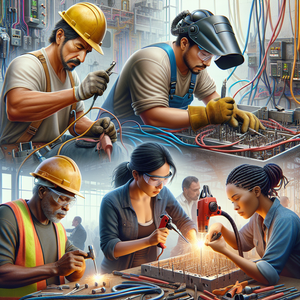The TikTok Trade School Revolution: How Social Media is Democratizing Skilled Trades

Traditionally, mastering a skilled trade demanded years of apprenticeship, classroom study, or the financial burden of technical school tuition. Now, thanks to TikTok’s short-form video format, users can access high-quality instruction in digestible, minute-long clips. Influencers such as @curlyleach (welding), @housedoctorgabby (plumbing), and @thewoodfather (carpentry) have amassed large followings by breaking down complex tasks into simple, actionable steps. For example, a typical video from Curly Leach might show how to create a flawless weld bead, complete with clear visuals, step-by-step narration, and practical tips. This engaging, concise format matches the modern attention span and makes starting a new skill feel achievable—even for total beginners.
From Passive Viewers to Active Learners
What sets TikTok apart from traditional learning is its interactive, community-driven nature. Watching a trade influencer demonstrate how to fix a leaky pipe or build a bookshelf is just the beginning; the real magic happens in the comment sections. Here, viewers ask questions, share their own solutions, and post videos of their attempts, turning the platform into a virtual workshop. This dynamic, peer-to-peer environment demystifies skilled trades. No longer do these professions seem exclusive or intimidating. Instead, viewers see people like themselves—often young, diverse, and relatable—making mistakes, learning, and improving. This relatability lowers the psychological barrier to entry, motivating more people to roll up their sleeves and give it a try.
Influencers as Gateways to Real-World Careers
The influence of TikTok trade creators doesn’t stop at digital inspiration. Many go beyond tutorials to offer guidance on entering the trades as a career. Curly Leach, for example, frequently discusses the benefits of welding and machining programs that can be completed in as little as six months, emphasizing how these short-term courses can lead to high-paying jobs with strong job security. Other influencers, like @tradeswomanjess and @mechanicmike, share their own career journeys, spotlighting apprenticeship opportunities, trade schools, and industry certifications. These stories have real-world impact—numerous viewers report enrolling in trade programs, starting side hustles, or even switching careers entirely after discovering their passion through TikTok. A 2023 study by the National Center for Construction Education and Research noted a surge in trade program enrollments, with many students citing viral social media content as their initial spark. The path from online curiosity to hands-on expertise has never been more accessible.
Breaking Stereotypes and Building Diverse Communities
Perhaps most transformative is the way TikTok is shattering stereotypes about who belongs in the trades. For decades, fields like welding, plumbing, and carpentry have been dominated by a narrow demographic. Now, creators from diverse backgrounds—women, people of color, LGBTQ+ individuals—are claiming their space and inspiring others to do the same. The hashtag #WomenInTrades, with millions of views, features women confidently welding, wiring, and woodworking, challenging outdated norms and fostering inclusivity. This visibility matters: it not only broadens representation, but also signals to underrepresented groups that skilled trades are viable, rewarding paths open to all.
Supporting Evidence: The Curly Leach Effect
Interest in authentic trade influencers is on the rise. Searches for “Curly Leach” demonstrate a surge in curiosity about skilled trades and the personalities who make them accessible. Curly Leach’s content, for instance, provides a snapshot of what modern trade education looks like—hands-on, efficient, and lucrative. Programs highlighted by these creators often require just six months of training, yet can lead to salaries well above the national average. This data underscores the real-world benefits of the TikTok trade revolution: not only are more people learning valuable skills, but they’re also unlocking financially stable, in-demand careers.
The TikTok trade school revolution is more than a fleeting trend—it marks a fundamental transformation in how skilled trades are taught, learned, and perceived. By leveraging the power of short-form video and peer engagement, platforms like TikTok are democratizing access to trade knowledge, breaking down old stereotypes, and inspiring a new generation of welders, carpenters, plumbers, and more. As the demand for hands-on expertise grows in the modern economy, the next wave of skilled professionals may very well have learned their first lessons not in a classroom or workshop, but on their smartphones—one swipe, one tutorial, and one supportive comment at a time. The future of trade education is here, and it’s more open, inclusive, and accessible than ever before.
Welding Fabricator (Entry-Level)
Local fabrication shops, shipyards (e.g., Huntington Ingalls Industries), and manufacturing facilities (Caterpillar, John Deere)
Responsibilities
Interprets blueprints and technical drawings to fabricate metal structures or components.
Performs MIG, TIG, or stick welding for construction, manufacturing, or repair projects.
Inspects finished welds for structural integrity and compliance with safety standards.
Required Skills
Proficiency in reading schematics and measuring tools; basic math and geometry.
Certification from a welding program (often 6-12 months) such as AWS (American Welding Society) is highly valued.
Attention to detail, manual dexterity, and a strong safety orientation.
Plumbing Apprentice
Plumbing contractors, municipal maintenance departments, larger property management firms
Responsibilities
Assists licensed plumbers in installing, maintaining, and repairing water supply and drainage systems in residential or commercial settings.
Learns to troubleshoot leaks, clogs, and faulty fixtures under supervision.
Prepares job sites by gathering materials and ensuring compliance with local codes.
Required Skills
Basic mechanical aptitude and willingness to learn through on-the-job training.
Physical stamina for lifting, crawling, and working in confined spaces.
Enrollment in a state-registered apprenticeship program or willingness to obtain one.
Residential Carpenter (Finish Carpentry Specialist)
Home builders (e.g., Lennar, PulteGroup), renovation firms, and custom millwork shops
Responsibilities
Installs interior trim, cabinetry, crown moulding, and custom woodwork in new builds or renovations.
Reads and interprets project blueprints, measuring and cutting materials to precise specifications.
Works closely with general contractors and designers to deliver high-quality, detailed finishes.
Required Skills
Skilled with hand and power tools, and adept at fine measurement and layout.
Experience with joinery, sanding, staining, and finishing techniques.
Strong portfolio of completed projects or trade school certification in carpentry.
Automotive Service Technician (Diagnostics Focus)
Dealerships (Ford, Toyota), national repair chains (Midas, Firestone), and independent garages
Responsibilities
Uses advanced diagnostic tools and computerized systems to identify, troubleshoot, and repair vehicle engine, electrical, and emissions issues.
Performs manufacturer-recommended maintenance, recalls, and complex repairs on modern vehicles.
Stays current with evolving automotive technology through ongoing education.
Required Skills
Completion of an accredited postsecondary automotive technology program or ASE (Automotive Service Excellence) certification.
Strong analytical thinking, comfort with digital diagnostic tools, and attention to detail.
Ability to communicate technical findings to customers and team members.
Electrical Lineworker (Utility Apprentice)
Regional electric utilities (Duke Energy, Pacific Gas & Electric), municipal utility companies, and private contractors
Responsibilities
Assists in installing, maintaining, and repairing electrical power distribution and transmission lines.
Climbs utility poles, operates bucket trucks, and works outdoors in various weather conditions.
Follows strict safety protocols and collaborates with experienced journeymen.
Required Skills
High school diploma or GED; completion of a pre-apprenticeship or utility-sponsored training program is often required.
Physical fitness, comfort with heights, and strong teamwork skills are essential.
Must be willing to obtain a Commercial Driver’s License (CDL) and pass safety certifications.


